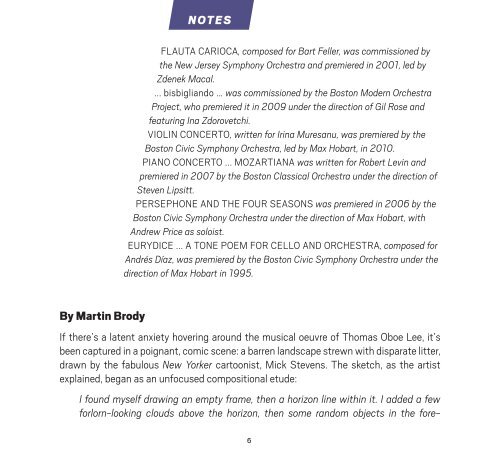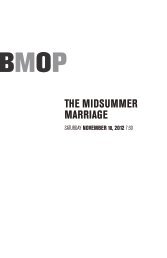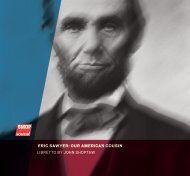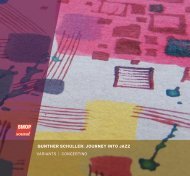Download the album booklet - Boston Modern Orchestra Project
Download the album booklet - Boston Modern Orchestra Project
Download the album booklet - Boston Modern Orchestra Project
You also want an ePaper? Increase the reach of your titles
YUMPU automatically turns print PDFs into web optimized ePapers that Google loves.
y martin brody<br />
notes<br />
Flauta CarioCa, composed for Bart Feller, was commissioned by<br />
<strong>the</strong> New Jersey Symphony <strong>Orchestra</strong> and premiered in 2001, led by<br />
Zdenek Macal.<br />
... bisbigliando ... was commissioned by <strong>the</strong> <strong>Boston</strong> <strong>Modern</strong> <strong>Orchestra</strong><br />
<strong>Project</strong>, who premiered it in 2009 under <strong>the</strong> direction of Gil Rose and<br />
featuring Ina Zdorovetchi.<br />
Violin ConCerto, written for Irina Muresanu, was premiered by <strong>the</strong><br />
<strong>Boston</strong> Civic Symphony <strong>Orchestra</strong>, led by Max Hobart, in 2010.<br />
Piano ConCerto ... Mozartiana was written for Robert Levin and<br />
premiered in 2007 by <strong>the</strong> <strong>Boston</strong> Classical <strong>Orchestra</strong> under <strong>the</strong> direction of<br />
Steven Lipsitt.<br />
PersePhone and <strong>the</strong> Four seasons was premiered in 2006 by <strong>the</strong><br />
<strong>Boston</strong> Civic Symphony <strong>Orchestra</strong> under <strong>the</strong> direction of Max Hobart, with<br />
Andrew Price as soloist.<br />
eurydiCe ... a tone PoeM For Cello and orChestra, composed for<br />
Andrés Díaz, was premiered by <strong>the</strong> <strong>Boston</strong> Civic Symphony <strong>Orchestra</strong> under <strong>the</strong><br />
direction of Max Hobart in 1995.<br />
if <strong>the</strong>re’s a latent anxiety hovering around <strong>the</strong> musical oeuvre of thomas oboe lee, it’s<br />
been captured in a poignant, comic scene: a barren landscape strewn with disparate litter,<br />
drawn by <strong>the</strong> fabulous New Yorker cartoonist, Mick stevens. <strong>the</strong> sketch, as <strong>the</strong> artist<br />
explained, began as an unfocused compositional etude:<br />
I found myself drawing an empty frame, <strong>the</strong>n a horizon line within it. I added a few<br />
forlorn-looking clouds above <strong>the</strong> horizon, <strong>the</strong>n some random objects in <strong>the</strong> fore-<br />
6 7<br />
ground: an old tire, a tin can, an empty bottle, a pencil, and assorted debris. I stared<br />
at this melancholy scene for a while <strong>the</strong>n added a box at <strong>the</strong> top for a title. I was<br />
stuck <strong>the</strong>re for a while, <strong>the</strong>n eventually lettered <strong>the</strong> words “Life Without …” in <strong>the</strong> box.<br />
The drawing could represent life without something, but what?<br />
life without … ? as stevens recounted, <strong>the</strong> music filling his studio abruptly came to a halt<br />
just as he was pondering this question:<br />
I heard ‘Eine Kleine Nachtmusik’ suddenly stop playing behind me and <strong>the</strong>n heard<br />
<strong>the</strong> sad, crunching sound tapes make when <strong>the</strong>y self-destruct in a cassette-player’s<br />
mechanism as <strong>the</strong>y die.<br />
thus, <strong>the</strong> riddle was solved: Life Without Mozart.<br />
unsurprisingly, stevens’s cartoon, a mute image that at once illustrates and silently performs<br />
its own meaning, is a big favorite of my dear friend, thomas oboe lee. For tom,<br />
<strong>the</strong> possibility of life without Mozart (and pars pro toto: life without music) triggers a<br />
primal fear, one that leads to drastic measures. his own torrential musical outpouring<br />
triumphantly hedges against silence and isolation. Composing functions not only to fill<br />
<strong>the</strong> void; it binds toge<strong>the</strong>r <strong>the</strong> things (and people) of <strong>the</strong> world. tom creates new works<br />
in an undaunted spirit of homage and sociability. his unbridled enthusiasms (from oscar<br />
Wilde to Cornell boxes) transmute into fresh compositions at an alarmingly fast pace. at<br />
<strong>the</strong> same time, his music always seems to arise from an irrepressible zeal to bring people<br />
toge<strong>the</strong>r. it’s sparked by a genius for collaborating with virtuoso performers and for seizing<br />
each opportunity to perform virtuosic acts of friendship. For tom lee, music making is <strong>the</strong><br />
zenith of sociability, just as sociability is a kind of music.<br />
in this felicitous world, <strong>the</strong> initial sounds of lee’s programmatic cello concerto, Eurydice,<br />
may feel like a threat. <strong>the</strong> piece begins with a calamitous (and hardly comic) rendering<br />
of life Without Mozart—a limit case beyond <strong>the</strong> margin of sociability that can be heard










